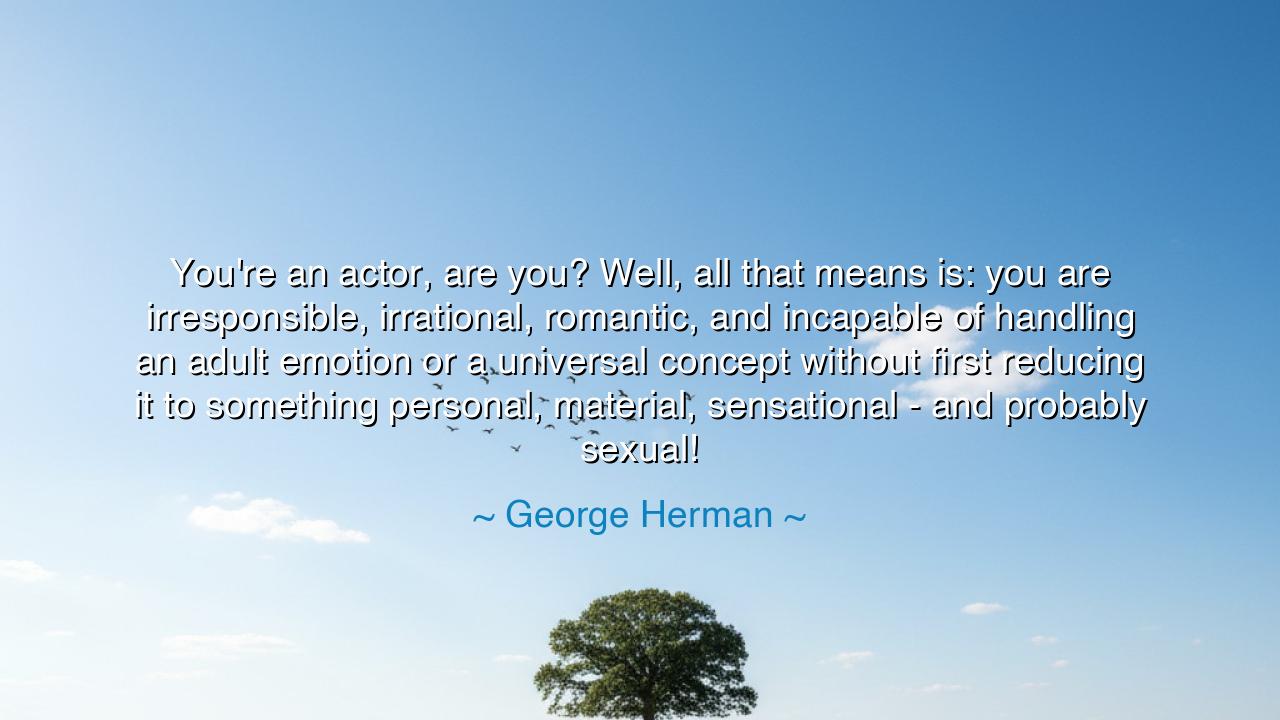
You're an actor, are you? Well, all that means is: you are
You're an actor, are you? Well, all that means is: you are irresponsible, irrational, romantic, and incapable of handling an adult emotion or a universal concept without first reducing it to something personal, material, sensational - and probably sexual!






Listen closely, O seekers of wisdom, to the words of George Herman, who presents a view of the actor that is both critical and profound: "You're an actor, are you? Well, all that means is: you are irresponsible, irrational, romantic, and incapable of handling an adult emotion or a universal concept without first reducing it to something personal, material, sensational—and probably sexual!" In these words, Herman highlights the inherent tension between the lofty ideals of art and the often unsettling nature of the artist’s role. The actor, in his view, is not simply a vehicle for portraying grand ideas or deep emotional truths, but one who must, by the very nature of their craft, distill complex, universal concepts into something more tangible, personal, and often, sensational.
In the ancient world, actors were regarded not simply as entertainers but as conduits of the gods, the storytellers who carried the weight of human experience through their performances. Yet, even in ancient Greece, the role of the actor was fraught with tension. Sophocles, Euripides, and Aeschylus crafted tragedies that explored universal themes such as fate, justice, and the will of the gods, but the actors who performed these stories had to humanize these lofty themes. In the end, the actors had to embody the human condition—not as divine beings, but as flawed, imperfect individuals. Like the great tragedians of old, modern actors must face the challenge of making the universal personal—of taking a grand concept and relating it to the everyday experiences of the audience, who may otherwise struggle to connect with abstract or idealized notions.
Herman’s words suggest a critique of this very process. The actor, in his view, cannot simply present the universal truth; instead, they must distort it in some way, bringing it down to a personal and material level—often reducing it to emotion or sensationalism. Consider the story of Oedipus, who seeks to understand the truth of his origins only to discover that he has unwittingly fulfilled the prophecy that foretold he would kill his father and marry his mother. This tragic discovery is both a personal journey for Oedipus, as he seeks to understand his own identity, and a universal reflection on the futility of human knowledge and the limits of control. In the performance of such a play, the actor is tasked with conveying not just the grand fate of the character, but the personal torment and emotion that the character feels in their inevitable downfall. The universal truth becomes personalized through the emotion the actor brings to the role.
Yet, in Herman’s critique, there is a recognition that such personalization is not merely a flaw of the actor, but an inevitable truth of the craft. The actor, like the ancient bards, must take the universal themes and make them felt—turning them into something that speaks directly to the human heart. In many ways, this is the purpose of art—to make the abstract and universal tangible, to ground lofty concepts in the reality of human emotion and experience. But in doing so, the actor often becomes caught in a tension between the desire for truth and the inevitable sensationalism required to connect with their audience. The actor, therefore, must walk the fine line between maintaining the dignity of the universal and offering it up in a form that the audience can embrace.
Consider the tragic hero of Hamlet, whose dilemma is both deeply personal—he must avenge his father’s death—and universal—the question of revenge, justice, and the nature of the human soul. In Shakespeare’s hands, Hamlet is transformed from a prince on a personal mission to a symbol of human doubt, indecision, and the complexity of moral choice. The actor playing Hamlet must embody this inner turmoil, turning philosophical and existential questions into raw, personal emotion. This is the true challenge of the actor: to take something as abstract as the search for meaning and make it not only understandable but emotionally powerful for the audience. It is here that Herman’s critique holds weight—actors must make universals personal, often reducing them to more relatable feelings and sensational experiences.
Thus, O wise ones, there is a lesson here for both the artist and the observer of art: the role of the actor is not merely to present truth in its most pure form, but to channel the universal through the personal. The actor is tasked with both representing the grandest themes and making them real for the audience—often by navigating the tension between the abstract and the sensational. This is not a flaw, but the very essence of art, as it seeks to translate the invisible into the visible, the immense into the relatable.
In your own life, O seekers, remember that the universal truths—whether about love, duty, loss, or joy—are often best understood through their personal expression. Just as an actor brings life to the abstract through emotion, so too must you find ways to express your truths in ways that are meaningful not only to yourself but to those around you. Whether in your work, your relationships, or your art, take the grand ideas and make them personal—transform the universal into something that resonates deeply with the heart.






AAdministratorAdministrator
Welcome, honored guests. Please leave a comment, we will respond soon